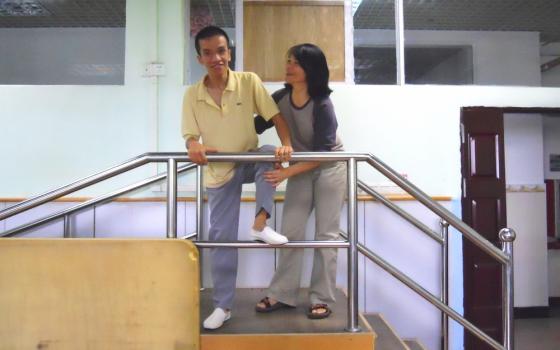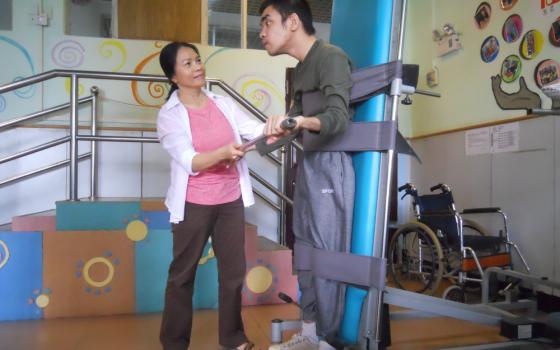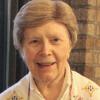"Does the government interfere with your work?" the foreign visitor asked Hà. "I just heard one of the children call you 'Sister.' Does the government know that you're a religious sister, and still they let you work here?" As a Maryknoll missionary working in China, Ngoc Hà Pham, like every Maryknoll Sister, including myself, who has worked in China, has answered those questions repeatedly.
Hà recalls, "On the first of three days of school orientation, we foreign students were told — and the laws were displayed on an overhead projection in large print — that prostitution, drug-trafficking and missionary work are against the law. When I heard this, I thought to myself, I'm in good company with our Lord Jesus."
Foreign missionaries are not invited to engage in works of direct evangelization in mainland China as they are in Hong Kong and Macau, which operate on a different governmental system. Maryknoll Sisters, however, since China's opening in the early 1980s, have worked as professionals in 27 Chinese universities, some for more than 20 years.
Each one of us teaching in China was required to sign a contract specifying we would not use our subject matter as an excuse to proselytize. Depending on the local Party officials, surveillance and enforcement varied significantly, ranging from students being free or forbidden from contacting teachers outside of class or for foreign teachers being free or forbidden to fraternize with the Chinese faculty. In spite of the few restrictions imposed, teaching in China proved a positive experience for all the missioners for a variety of reasons.
At her debriefing session, Sister Marya said it this way: "It was mind blowing to meet people who had never read the Bible, never been inside a church, and who wanted to hear the real story of Christmas, people for whom obtaining a passport was almost an impossibility and who never ceased to be amazed that I could travel unimpeded within my own country or abroad. I not only grew to appreciate all the advantages I have had materially, socially and politically but also spiritually."
In addition, a few missioners have been able to work quite freely as volunteers with lepers or those with physical and/or intellectual disabilities, services not sufficiently provided by the government. It is within this context that Hà started volunteering her nursing and translation services at Huiling in Guangzhou, China. Huiling is one of more than 7000 NGOs operating in China.
Until recently, all of these have worked in relative independence and autonomy providing services badly needed in China. However, a new law just passed, that will go into effect next January, requires that all foreign groups be officially China-sponsored and registered with the police. The government maintains it is enacting the law to protect friendly organizations and to insure that China's national interests are safeguarded from political and religious activities harmful to the nation's unity. It is not surprising that many NGOs are nervous about this.
But who is Hà and why would she choose to work for nothing in China, doing what most would avoid? When North Vietnam came under Communist control in 1954, Ngoc-Hà Pham's father, fearing religious persecution, fled with his family to the south. Hà was born in Saigon in 1964. Peace in South Vietnam came to a halt when Saigon fell to the Communists in 1975. Once again, Hà's father sought an escape for himself and his family. In the chaos that followed, most of the family, including Hà, managed to board an overcrowded U.S. military plane filled with panic-stricken adults and screaming children. After the plane was airborne, Hà realized that the whole family was not on the plane. Her mother and two brothers were missing. She would not see her mother and brothers again for 10 years.
Working her way through college, Hà received a degree in nursing. One day, while praying to know God's will for her, her eyes fell on the January 1996 Maryknoll Magazine which happened to carry the article "Viêt Nàm Visit." She sent the magazine's completed vocation clip to the Maryknoll Sisters, and in the year 2000, she joined their community.
In 2003, following the completion of her orientation program to religious, missionary life, Hà was missioned to El Salvador. After language study, she worked mostly in the AIDS clinic with other Maryknoll Sisters. Seven years later, after serious reflection and making her final vows, Hà wrote, "Something in me is calling for a change; the time is right." The Maryknoll central leadership approved Hà's request for a transfer to Maryknoll's China mission. In the fall of 2010, Hà began her language studies in Mandarin at Sun Yat Sen University, Guangzhou, China.
Hà started her volunteer services at Huiling after completing two years of language study. Huiling means a "brilliant spirit," and its mission is to improve the quality of the lives of the mentally and physically disabled and their families. Given the nature of the work and the students, as they are called, Huiling is not likely to engage in promoting human rights, democracy or environmental education as the government may suspect of some NGOs, and so, it is not likely to be affected by the new law or come under government control.
The students at Huiling are taught to do the simple tasks of daily life such as eating, crossing the street and washing their hands. They are as young as 6 and as old as 50.
"I love the name 'A Brilliant Spirit,'" says Hà. "It is so beautifully fitting, for each person embodies a distinctively unique spirit. Though they understand simple language, the majority can only communicate by gestures and in their situation. They have their own habits — one student can play with a colorful marble all day long with a contented smile. Another can go around and surprise you from behind with a big bear hug. Another goes around saying, 'Sister, today you look so beautiful.' He says this to everybody and actually — he is completely blind."
Protection for persons with disabilities is fairly new in China. In the early 1980s when China began to open up to the outside world, it adopted many aspects of Western progress. It set up The China Fund for the Disabled in 1984, The China Disabled Persons Federation in 1988, and the Laws on the Protection of Persons with Disabilities in 1990; the laws ensure civil rights and guarantee employment, education, welfare, and access to the disabled. Old attitudes, however, die hard in a culture where many believe that mental or physical disabilities are punishment for parental sins, which carry shame and guilt. While progress is more marked in the cities, handicapped children and adults often fare badly. Like lepers, they are often kept from the public eye.
Most of the staff at Huiling have only a junior high school education and come from north China. They have come south where jobs are more plentiful but without any real training in working with disabled people; they are at a disadvantage, often challenged beyond their abilities. One reason Hà thinks the government makes no real demands on her is that she there doing what most people would not choose to do.
"There is a constant turnover. As soon as something better comes along, they leave. Another reason they do not make any demands on me is I believe in my heart that God wants me in China."
"Initially," said Hà, "I was introduced as 'Sister' before I had a chance to tell my friend not to address me as such, but the word sister has stuck both with the staff and the students. The fact is, of course, that most people do not know what a sister is and much less who God is."
In mainland China, Hà is at an advantage. She looks Chinese and does not call attention to herself. She lives with two local sisters, a very simple life, devoid of the modern conveniences she finds when she returns, on a regular basis to her Maryknoll community in Hong Kong.
After volunteering for three months, Hà was surprised when the founders invited her to be on the regular staff and "asked me to collaborate in developing a spiritual dimension to the ministry.
The Holy Spirit is present here and the staff keep asking, "Why are you here? You are doing this for free and still you are so happy."
Ha knows why she is there: "I am not there to preach or to evangelize, at least not by words. Instead of telling people about God's mercy, I try to share God's love with them and share my love through deeds. You don't need to use many words; rather you speak with your heart. People's curiosity takes them wherever their hearts are willing to go."
[Betty Ann Maheu is a Maryknoll Sister with degrees in drama, theology, Italian and Chinese. She spent 18 years in Hawaii teaching and doing education administration before serving on the Maryknoll leadership team then with the International Union of Superiors General as a coordinating editor and translator for the UISG main publication (Bulletin). A frequent traveler to China, she has taught English there and for 15 years served at the Holy Spirit Study Centre in Hong Kong.]



